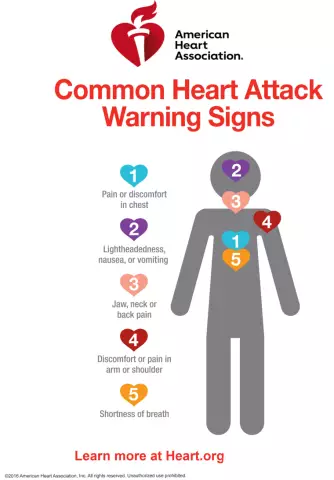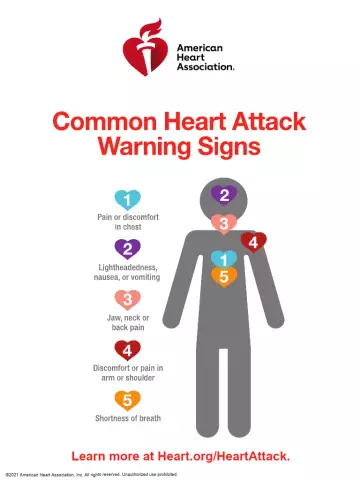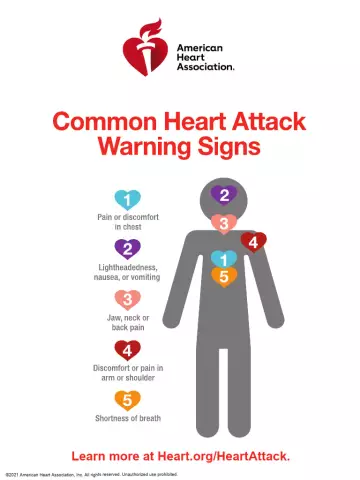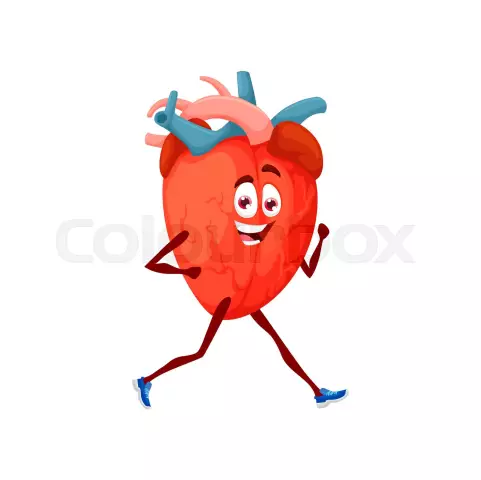- Author Rachel Wainwright wainwright@abchealthonline.com.
- Public 2023-12-15 07:39.
- Last modified 2025-11-02 20:14.
5 signs of possible heart problems
Diseases of the heart and blood vessels lead to disruption of the blood supply to organs and tissues, which entails malfunctions in the body, deterioration of well-being, and a decrease in working capacity and living standards. More than 17 million inhabitants of our planet die from pathologies of this kind every year.
The danger of cardiovascular diseases is that they can develop asymptomatically for a long time. Contrary to popular belief, such conditions do not always manifest themselves with chest pain, heart rhythm disturbances, and other obvious signs. Often, a person who feels well on the whole already has cardiovascular pathology without knowing it. Considering that ailments of this kind are increasingly affecting young people who are not inclined to waste time visiting doctors, mortality from diseases such as acute heart failure, coronary heart disease, angina pectoris, stroke and myocardial infarction is constantly increasing.
However, you can significantly reduce personal risks by opting for a healthy lifestyle, reasonable physical activity, and control of your health. Therefore, it is very important to know what signs should be the reason for a visit to a specialist and examination.
Inflammation of the gums and oral mucosa
The consequence of failures in the work of the heart is insufficient blood supply to peripheral vessels (capillaries). The power of the "pump" is simply not enough to push the blood into them. Oxygen and nutrient deficiencies primarily affect the mucous membranes. They become very susceptible to minor injuries and susceptible to the effects of pathogens.
If a person has bleeding gums, loose teeth, pustules on the oral mucosa, this may indicate heart failure.

Source: depositphotos.com
Pain in the lower jaw
Angina pectoris is a disease that occurs due to a mismatch between the need for coronary vessels in blood flow and its actual supply. The main symptom is attacks of heart pain with physical or nervous tension. Unpleasant sensations can last from 1 to 15 minutes, and the pain builds up gradually, but quickly disappears when the load stops (for example, for a person who walks quickly, sometimes it is enough to stop to relieve an attack).
Pain with angina pectoris appears behind the sternum and radiates to the left arm and shoulder, lower jaw and teeth on the left. Such sensations, which arise periodically under strong stress and pass at rest, are a diagnostic sign of an illness.

Source: depositphotos.com
Prolonged colds
Seasonal infections are very difficult for people with heart failure. Phenomena such as increased body temperature and shortness of breath create an increased demand for oxygen in the body, and the intensity of the heart increases. Normally, acute symptoms of influenza or SARS bother a person for no more than 5 days, and in the heart they can be observed for 10 days or even longer. In addition, these patients are at high risk of developing complications from the flu, such as pneumonia, which in turn can lead to heart attacks. According to experts, more than half of the people who die from the flu in European countries are heart disease.

Source: depositphotos.com
Snore
Difficulty breathing during sleep and heart failure are closely related. On the one hand, it has been found that apnea is a risk factor for the development of cardiac disorders. So, for people who periodically stop breathing during sleep, the likelihood of myocardial infarction increases approximately threefold. On the other hand, the presence of night snoring indicates that the body is experiencing a lack of oxygen, possibly caused by malfunctioning of the heart.

Source: depositphotos.com
erectile disfunction
The deterioration of potency is one of the first signals of malfunctions in the cardiovascular system, since the quality of an erection directly depends on how successfully the blood enters the peripheral vessels. According to statistics, about 60% of men who visit cardiologists note that they had delicate problems long before the onset of chest pain, heart rhythm irregularities and other clear diagnostic signs of heart disease. In women, similar problems are expressed in the difficulty of obtaining an orgasm and a general decrease in libido.

Source: depositphotos.com
Each of the described signs may have other causes that are not associated with cardiac disorders. However, if such symptoms are observed regularly and are supplemented by increased fatigue, shortness of breath and dizziness, it makes sense to consult a cardiologist. Heart disease is chronic, but early treatment usually enables the patient to maintain a long-term capacity for work and maintain a high quality of life.
YouTube video related to the article:

Maria Kulkes Medical journalist About the author
Education: First Moscow State Medical University named after I. M. Sechenov, specialty "General Medicine".
Found a mistake in the text? Select it and press Ctrl + Enter.






